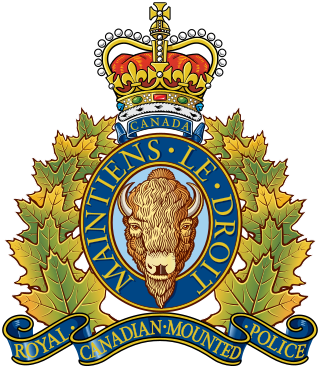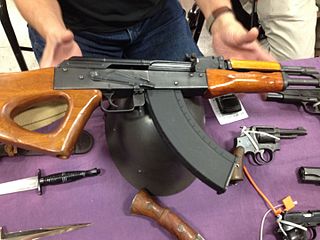Related Research Articles
Gun laws and policies, collectively referred to as firearms regulation or gun control, regulate the manufacture, sale, transfer, possession, modification, and use of small arms by civilians. Laws of some countries may afford civilians a right to keep and bear arms, and have more liberal gun laws than neighboring jurisdictions. Countries that regulate access to firearms will typically restrict access to certain categories of firearms and then restrict the categories of persons who may be granted a license for access to such firearms. There may be separate licenses for hunting, sport shooting, self-defense, collecting, and concealed carry, with different sets of requirements, permissions, and responsibilities.

The right to keep and bear arms is a right for people to possess weapons (arms) for the preservation of life, liberty, and property. The purpose of gun rights is for self-defense, including security against tyranny, as well as hunting and sporting activities. Countries that guarantee the right to keep and bear arms include the Czech Republic, Guatemala, Switzerland, Ukraine, the United States, and Yemen.
The Sullivan Act was a gun control law in New York state that took effect in 1911. The NY state law requires licenses for New Yorkers to possess firearms small enough to be concealed. Private possession of such firearms without a license was a misdemeanor, and carrying them in public is a felony. The law was the subject of controversy regarding both its selective enforcement and the licensing bribery schemes it enabled. The act was named for its primary legislative sponsor, state senator Timothy Sullivan, a Tammany Hall Democrat.
Gun laws in Australia are predominantly within the jurisdiction of Australian states and territories, with the importation of guns regulated by the federal government. In the last two decades of the 20th century, following several high-profile killing sprees, the federal government coordinated more restrictive firearms legislation with all state governments. Gun laws were largely aligned in 1996 by the National Firearms Agreement. In two federally funded gun buybacks and voluntary surrenders and State Governments' gun amnesties before and after the Port Arthur Massacre, more than a million firearms were collected and destroyed, possibly a third of the national stock.
Concealed carry, or carrying a concealed weapon (CCW), is the practice of carrying a weapon in public in a concealed manner, either on one's person or in close proximity. CCW is often practiced as a means of self-defense. Every state in the United States allows for concealed carry of a handgun either permitless or with a permit, although the difficulty in obtaining a permit varies per jurisdiction.

Canadian Firearms Program, formerly Canada Firearms Centre is a Canadian government program within the Royal Canadian Mounted Police Policing Support Services, responsible for licensing and regulating firearms in Canada.

Gun show loophole is a political term in the United States referring to the sale of firearms by private sellers, including those done at gun shows, that do not require the seller to conduct a federal background check of the buyer. This is also called the private sale exemption. Under federal law, any person may sell a firearm to a federally unlicensed resident of the state where they reside, as long as they do not know or have reasonable cause to believe that the person is prohibited from receiving or possessing firearms.
As of 2005 in Brazil, all firearms are required to be registered with the minimum age for gun ownership being 25. It is generally illegal to carry a gun outside a residence, and a special permit granting the right to do so is granted to certain groups, such as law enforcement officers. For citizens to legally own a gun, they must have a gun license, which costs R$88,00 and pay a fee every ten years to renew the gun register. The registration can be done online or in person with the Federal Police. Until 2008, unregistered guns could be initially registered at no cost for the gun owner, the subsequent referring fee each decade would then apply.

In the United States, open carry refers to the practice of visibly carrying a firearm in public places, as distinguished from concealed carry, where firearms cannot be seen by the casual observer. To "carry" in this context indicates that the firearm is kept readily accessible on the person, within a holster or attached to a sling. Carrying a firearm directly in the hands, particularly in a firing position or combat stance, is known as "brandishing" and may constitute a serious crime, but that is not the mode of "carrying" discussed in this article.

Gun violence in the United States results in tens of thousands of deaths and injuries annually, and was the leading cause of death for children 19 and younger in 2020. In 2018, the most recent year for which data are available as of 2021, the Centers for Disease Control and Prevention's (CDC) National Center for Health Statistics reports 38,390 deaths by firearm, of which 24,432 were by suicide. The rate of firearm deaths per 100,000 people rose from 10.3 per 100,000 in 1999 to 12 per 100,000 in 2017, with 109 people dying per day or about 14,542 homicides in total, being 11.9 per 100,000 in 2018. In 2010, there were 19,392 firearm-related suicides, and 11,078 firearm-related homicides in the U.S. In 2010, 358 murders were reported involving a rifle while 6,009 were reported involving a handgun; another 1,939 were reported with an unspecified type of firearm. In 2011, a total of 478,400 fatal and nonfatal violent crimes were committed with a firearm. Gun crimes are covered by 18 USC 922 and 18 USC 924, which are the principal federal firearm statutes.

Gun-related violence is violence committed with the use of a firearm. Gun-related violence may or may not be considered criminal. Criminal violence includes homicide, assault with a deadly weapon, and suicide, or attempted suicide, depending on jurisdiction. Non-criminal violence includes accidental or unintentional injury and death. Also generally included in gun violence statistics are military or para-military activities.
In Chicago, crime has been tracked by the Chicago Police Department's Bureau of Records since the beginning of the 20th century. The city's overall crime rate, especially the violent crime rate, is higher than the US average. Chicago was responsible for nearly half of 2016's increase in homicides in the US, though the nation's crime rates remained near historic lows as of 2016. Some attribute the city's strong gang culture to the city's unusually high crime rate compared to neighboring cities, and some do not.
The gun laws of New Zealand are contained in the Arms Act 1983 statute, which includes multiple amendments including those that were passed subsequent to the 1990 Aramoana massacre and the 2019 Christchurch mosque shootings.

Gun laws in the Czech Republic in many respects differ from those in other European Union member states (see Gun laws in the European Union). The "right to acquire, keep and bear firearms" is explicitly recognized in the first Article of the Firearms Act. At the constitutional level, the Charter of Fundamental Rights and Freedoms includes the "right to defend own life or life of another person also with arms under conditions stipulated by law".

The Gun Court is the branch of the Jamaican judicial system that tries criminal cases involving firearms. The court was established by Parliament in 1974 to combat rising gun violence, and empowered to try suspects in camera, without a jury. The Supreme Court, Circuit Courts, and Resident Magistrate's Courts function as Gun Courts whenever they hear firearms cases. There is also a Western Regional Gun Court in Montego Bay. Those convicted by the Gun Court are imprisoned in a dedicated prison compound at South Camp in Kingston. Until 1999, the Gun Court sessions were also held in the same facility.

CanJet Flight 918 was a flight that was on 19 April 2009 to have taken off from Sangster International Airport (MBJ), Montego Bay, Jamaica, bound for Halifax Stanfield International Airport (YHZ), Halifax, Canada, but was instead seized before takeoff for hours by an armed, lone hijacker. This was the first incidence of a hijacking on Jamaican soil, and the second time a Canadian airliner has been hijacked.
The Firearms Act of Jamaica regulates the ownership and use of firearms and ammunition. It was first passed in 1967, and has been subsequently amended. The law requires gun licenses, with a yearly registration fee of JM$12,000.00. There were about 65,000 licensed firearms in Jamaica in 2002, and approximately seven hundred licenses approved per year. All crimes involving firearms are tried by a special Gun Court established in 1975.
In Honduras, the commerce, ownership, possession and use of firearms is regulated. Escalation in crime and the use of firearms in the commission of crimes and homicides has brought political and public discourse to consider regulation of arms.

Gun laws in Pennsylvania regulate the sale, possession, and use of firearms and ammunition in the Commonwealth of Pennsylvania in the United States.

Crime in Finland is combated by the Finnish police and other agencies.
References
- ↑ Luz, Daniel (5 June 2007). "Gun Courts". En la mira – The Latin American Small Arms Watch. Retrieved 13 June 2009.
- 1 2 3 4 5 6 7 Dean Weingarten, Jamaica: Draconian Gun Laws and Murder Rates, Ammoland.com, 4 December 2015 (accessed on 25 August 2019)
- 1 2 Lane, Winsome (24 May 1974). "Armed Troops, Police Patrol Jamaica Areas". The Virgin Islands Daily News. p. 5. Retrieved 13 June 2009.
- 1 2 3 "Stalag in Kingston". Time . 23 September 1974. Archived from the original on 22 December 2008. Retrieved 13 June 2009.
- ↑ Rowe, David P. (25 August 1998). "Trial by jury - right or privilege" (PDF). Archived from the original (PDF) on 19 November 2008. Retrieved 13 June 2009.
- ↑ "The Firearms Act". Firearm Licensing Authority. 2006. Archived from the original on 21 March 2009. Retrieved 18 June 2009.
- ↑ Tom Leonard, Running gun battles in Jamaica to protect island's drug lord, The Telegraph , 24 May 2010 (accessed on 25 August 2019)
- ↑ Livern Barrett, Obama Gun Control Could Help Jamaica, Jamaica-gleaner.com, 6 January 2016 (accessed on 25 August 2019)
- ↑ Jamaica declares emergency over parts of island as gun crime soars, Independent.co.uk, 21 January 2018 (accessed on 25 August 2019)
- ↑ Laura Smith-Spark, UK, Canada warn tourists after violent crime in Jamaica's Montego Bay, Cnn.com, 20 January 2018 (accessed on 25 August 2019)
- ↑ Chris Patterson, Firearms Act to Be Amended to Address Illegal Dealing and Possession, Jis.gov.jm, 21 March 2018 (accessed on 25 August 2019)
- ↑ Whyte, T. K. (24 November 2002). "Legal gun supplies dry up". The Observer. Archived from the original on 10 May 2008. Retrieved 13 June 2009.
- ↑ "All is not well in Ja, Commissioner says". The Jamaica Gleaner. 26 June 2001. Retrieved 13 June 2009.
- ↑ Rochelle Williams, Firearm Owners Urged to Store Weapons with JCF or FLA, Jis.gov.jm, 18 August 2016 (accessed on 25 August 2019)
- ↑ Kopel, David (1992). The Samurai, the Mountie and the Cowboy . New York: Prometheus Books. ISBN 978-0879757564.
- ↑ John R. Lott Jr., It’s already too late for gun control to work, Washingtonpost.com, 8 November 2016 (accessed on 25 August 2019)
- ↑ John R. Lott Jr., Jamaica's Bloody Lesson On Guns, Foxnews.com, 25 May 2010 (accessed on 25 August 2019)
